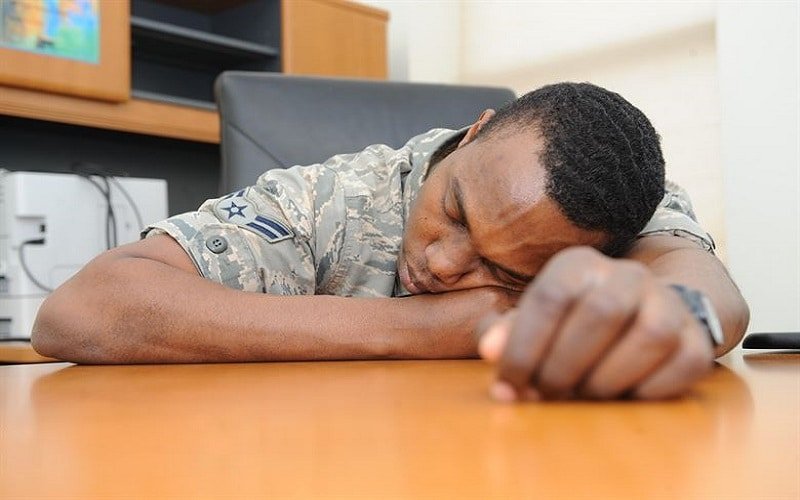Rest Up.
Many people are already aware of some of the unsavory benefits that come with sleep deprivation. However, a new study released on science report website Nature Communications suggests that behaviors like poor sleep patterns have the ability to keep people trapped within their vices due to a series of combining mental and physical effects that combo off each other, affecting not just how the sleep-deprived person sees the world, but how others see that sleep-deprived person.
The experiment took place over several stages. First, the study tested 18 participants who had agreed to pull an all-nighter the previous night. An FMRI scan of their brains confirmed their sleep deprivation, as did differences in their movements and body language that suggested to others their own desire to regress from the world – and go to sleep.
After the researches had confirmed that their test subjects were properly sleep-deprived, they moved onto the first section of the test: A social interaction experiment that they called “The Panic Button”.
In this experiment, subjects were presented with video clips of people walking up to the camera, and were given a “panic button” that they could press if they felt the subject in question got a tad too close. Times of presses that consistently differ from the sleep-deprived to the awake and healthy could show a number of things, such as an unwillingness to socialize with others or be in the same space with others.
And in practice, the test appeared to show just that, with those lacking a full night’s rest pressing the panic button up to 60 percent earlier than they did when they’d been able to get sleep the night previous.
One of the two authors of the study, Eti Ben-Simon, has a theory as to why this may be. He mentions that people who experience a lack of sleep often want to be further away from society and less connected to others, even though such a process would directly impede the survival of an individual who has underslept and is in a weakened state of mind. As he puts it, “we want to curl up into our nest, withdraw from society, and go to sleep.”
But phase two is where things really start to get interesting. The relatively small pool of 18 subjects doing deprived trials and then well-rested trials of the panic button allowed the researchers to see how those with sleep deprivation issues reacted to the world around them, but didn’t get them any clues as to how the world reacts to those with sleep deprivation.
For this, the researchers made sure the testers agreed to recordings of their performances using the panic button on both the nights they had and had not slept. These recordings were then shown to over 1,000 online participants, who were asked to rate the original subjects on a number of factors, including social desirability and loneliness.
Across the board, sleep-deprived persons looked lonelier and much less socially desirable. In other words, not only will sleep deprivation make you less willing to communicate and interact with others, it will also make those around you less interested in talking to you.
So what can be gained from this? Two things:
First, for the love of everything you love, get enough sleep. Sleep deprivation can destroy a person in more ways than anyone can count, and although you might be able to “make it through” a day on just 5 or 6 hours, you know you won’t be your best self.
If this study has anything to show about it, sleep deprivation can also encourage an antisocial, lonely lifestyle that often leads to increased time spent on digital devices, which in turn leads to more hours spent on an irregular sleep schedule. It’s a dangerous spiral that’s much more difficult to fall into than it is to escape.
Second: Although it wasn’t the study’s objective, a strong negative correlation between how lonely a person looks and how socially desirable they look has been uncovered here. These results suggest that people may naturally avoid those who seem to have given up on socially interacting with others, possibly because it could signal a person with unstable characteristics that have driven other away in the past.
But to fight against a psychological reaction, the most important thing to do is to be aware that you are experiencing the reaction. If your brain is giving you signals that a person isn’t socially attractive, and you believe the signals may be due to how lonely the person seems, give them a chance! Their unfriendliness could be caused by a number of factors; sleep deprivation is just one of many. But by making an attempt to break a person out of one such destructive cycle, you have the chance to seriously change their lives for the better.



















































Maya Asregadoo
August 15, 2018 at 11:24 pm
I would have thought that people would have evolved to seek out others when they need rest, as others would be able to protect those who need to sleep.
Alyssa
August 16, 2018 at 4:13 pm
Everyone has troubles sleeping and often gets less hours then they need, hopefully everyone can work on getting more sleep
Caroline Walker
August 17, 2018 at 11:29 pm
Very interesting. I pulled two all nighters this week before reading this article… I hope society still like me.